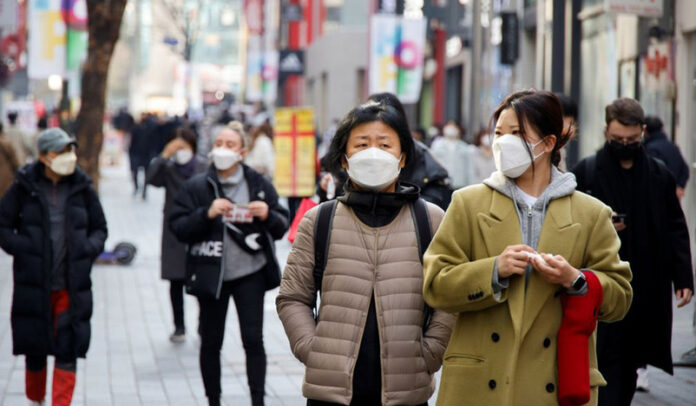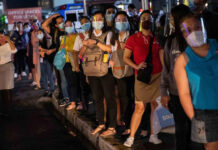Women wearing masks walk in a shopping district amid the coronavirus disease (COVID-19) pandemic in Seoul, South Korea, November 29, 2021.
South Korea reported a new daily record of 5,123 new coronavirus cases, as it battles to contain a sharp rise in patients with severe symptoms and stave off the Omicron variant, the Korea Disease Control and Prevention Agency (KDCA) said on Wednesday.
The government on Monday shelved plans to further relax COVID-19 curbs because of the strain on its healthcare system from rising hospitalisations and deaths as well as the possible threat posed by the new variant.
Hospitals were treating 723 patients with severe COVID-19, a record number, as the authorities scrambled to secure more ICU beds. Severe cases have seen a steep rise compared with just under 400 in early November.
ICU bed capacity in the greater Seoul area stood at 89.2%, Son Young-rae, a senior health official told a briefing.
To ease the strain on hospitals and care centres, South Korea this week began making at-home treatment the default for people with mild infections, with only more severe cases transferred to hospitals. Residential treatment centres will also be expanded.
More than 84% of the severely ill COVID-19 patients were aged 60 and above. Experts had pointed to waning antibody levels from the vaccines and urged the elderly to get booster shots.
Authorities will mobilise the administrative structure to secure hospital beds, at least an additional 1,300 by mid-December, Interior and Safety Minister Jeon Hae-cheol told a COVID-19 response meeting.
He also called for tighter virus prevention measures to head off Omicron, after suspected cases entered the country from Nigeria.
South Korea has not reported any confirmed Omicron cases so far.
Tuesday’s new cases bring the coronavirus infections in the country to 452,350 cases, with 3,658 deaths. Despite the rising hospitalisation rate, the mortality rate remains relatively low at 0.81%, KDCA data showed.
South Korea has fully vaccinated nearly 80% of its 52 million people, while the boosters for adults aged 18 to 49 only begin this Saturday. read more
Source: Reuters / Reporting by Sangmi Cha; Editing by Jacqueline Wong & Shri Navaratnam









